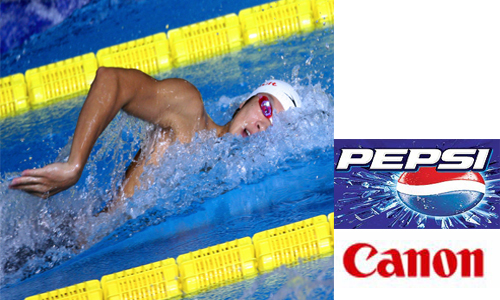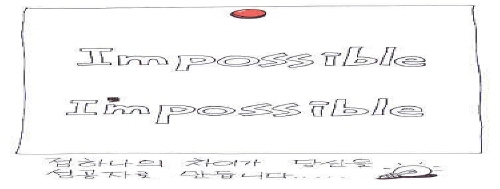
When Alexander the Great went on an expedition to the East, he passed through Phrygia. In Phrygia, there was a cart which was bound by a knot. It was said that a man, who can untie this knot, will control Asia. Several heroes were challenged to untie this knot. However, all of them failed, and the knot remained tied for thousands years. Although Alexander the Great was the King of Kings, a lot of people expected that it would be difficult for him to untie this knot. But, Alexander the Great looked at the Gordian knot. He drew his sword and cut the knot, and then he governed Asia just as the prophecy predicted. Nowadays, we have a different strategy with common people; different ideas to solve the problem. It is finding the way to untie the Gordian knot of modern competitive power.
1) The beginning of ‘Converted Conception ‘
Korean swimmer Park Tae Hwan, who is commonly called ‘Marine Boy’, wore a special swimsuit which drew the attention of many people. He will be wearing this special swimwear, which covers his whole body in the 2008 Beijing Olympics. The company supporting him made up this special swimwear. The company measured Park’s body in 174 sections, and processed operations of adjustment in a foreign institute 6 times. This swimwear was made by special fiber, so it weighs only 160 grams. The swimsuit decreases water friction and raises buoyancy, so most swimmers prefer to wear it rather than a common swimsuit. The inventor of the swimsuit originally used shark’s skin and invented it so that he could make a better swimming record. He was not content with the original swimwear design. Several other sport equipments including new swimming goggles were invented to decrease the record time, even if it’s only 0.01 second. These changes made up the first steps to the new converted conception.
Moreover, it is not only the sports industry that used this conversion of concept.
2) Untied the Gordian knot ? enterprise
First, there is the Pepsi beverage corporation. Many people think Pepsi is the second ranked company in the beverage industry. However, Pepsi’s overall sales outran Coca-Cola’s in 2004. In 2005, the Pepsi Company’s value outran Coca-Cola’s. Pepsi is now considered to occupy the first position of the beverage companies. Most of second ranked companies catch up to the first ranked companies by raising the quality of their products. Pepsi once competed with Coca-Cola’s flavor. The result of the consumer blind test said Pepsi was more delicious than Coca Cola. With this result, Pepsi Cola let people know their superb flavor. However, the result of Pepsi’s advertisement was a miserable defeat because most consumers choose Coke because of the companies’ brand images. Therefore, Pepsi changed their marketing to focus on another reason that would appeal to consumers.
There is a reason that Pepsi Cola outran Coca-Cola in sales and company value. It is not because a lot of consumers prefer Pepsi over Coca-Cola. Pepsi has attempted to become a multi-product company, not only selling carbonated drinks, but also other products in the snack industries. These days, Pepsi’s sales is made up by snack and distribution industries (about 80%), whereas Coca-Cola’s sales are still made up by carbonated drinks (about 80%).

Second, there is a digital camera enterprise called Canon. Let us see an example of Canon. They were ranked 5th or 6th among the digital camera enterprises in 2000. At that time, pixel competition was the biggest topic in the industry. When everyone said that the “Pixel is the digital camera’s most important factor” Canon was in hardship. But they made an “IXY DIGITAL” series with an impressive design in 2000. By the “IXY DIGITAL” series’ debut, the pixel competition changed to a small size, simple to use, and a high grace design competition. Canon became the front runner with SONY.
What precept is in Pepsi and Canon’s example of success? It is a Rule of Marketing Changeability, written by Jack Trout and Al Ries, who said that if you can’t be the top; make a new category that you can be in. In other words, if it is difficult to win in the war, move to another battlefield. If it is hard to win in the market, change the rule with bold concepts and action, and seize it. We call this “A Principle of Concept Differentiation”. (Korean First Marketing Strategy)
Third, there is the Korean seasoning business, Dasida. We can also find a successful domestic example of concept differentiation. An example is in the seasoning market. In the 1960s, Mi-one and Mi-poong were rivals. Mi-poong was always defeated in competition by Mi-one and always frustrated. At that time, Mi-poong did not understand the rule of concept differentiation. First, Mi-poong attacked a synthetic seasoning market with the same concept as Mi-one’s. Second, they announced themselves as the latter runner. These mistakes were Mi-poong’s biggest cause of defeat. Afterward, 제일제당 bought the Mi-poong and announced they broke off their synthetic seasoning products, which was a daring move, and would open a new product line called nature’s seasoning. This time, they succeeded in marketing. There was a shift in food trends, the Korean national income was increasing and they read about people’ changing interest in food. People began to prefer natural seasonings rather than artificial seasonings. They moved to the new product line called Nature’s Seasoning, not synthetic seasoning, and gained the final victory.
4) Convert conception depends on differentiation.
Trying a strategy of differentiation is not always successful. For example, the Pasteur Dairy, founded in 1987, launched a new milk sterilization technique using low temperatures. At that time, most dairy companies sterilized milk by using high temperatures. Pasteur’s method became a competitive good in the preexistent dairy industry.
The Pasteur dairy industry’s advertisement drew consumers’ attention. This advertisement used a quite aggressive and unexampled slogan. Therefore, the Fair Trade Commission brought in a lawsuit against the Pasteur Dairy Company.
The Pasteur Dairy Company was defeated in a court of law, but the Pasteur’s pasteurization process came into the spotlight. The Pasteur Dairy Company built up an image of premium milk products, and they became the final victor by setting a new record for selling.
This success became Pasteur’s main spring for its next action. The Pasteur Dairy Company attempted an economic take off by attacking its competitor’s milk with accusations of somatic cell contamination. This argument was quite an event. However, the controversy about milk containing somatic cells was handled by the press and it made consumers to turn away all kinds of milk products. Eventually, most companies lost significant sales. Although the Pasteur Dairy Company succeeded in hurting their competitors, they also hurt themselves. The Pasteur Dairy Company sales tumbled down as a nonpayment enterprise with the Asian economic crisis.
In this story, we can get the concept that if you neglect consumers’ original desires and try to oppress other companies with negative publicity, everyone can be destroyed. In other words, we can learn that moving battlefields though a negative issue can hurt the whole industry.

It is within bounds to say that Korea and Foreign enterprises are affected by new marketing trends that are focused on ideas. Competition for product differentiation and changing concepts in sports are highly related to us. They give a new turn to our lives and open another gateway to success. The only question is how to find these new turns and take care of them. So, be fearless of new changes, which are a primary solution to untying the Gordian knot of competition.

